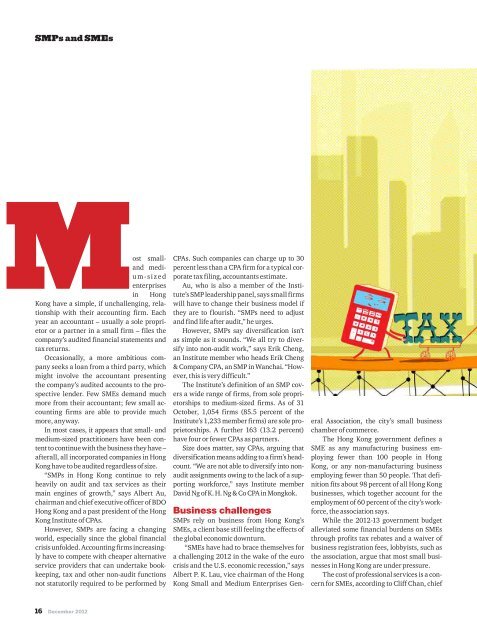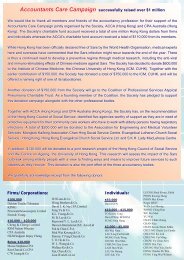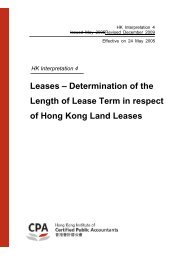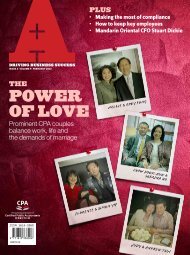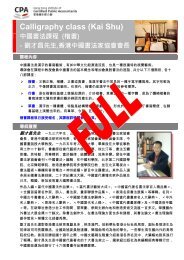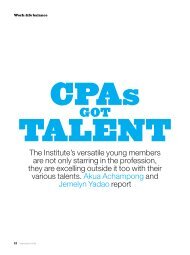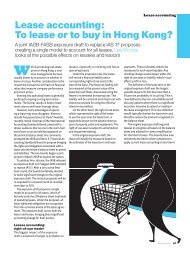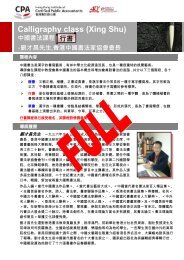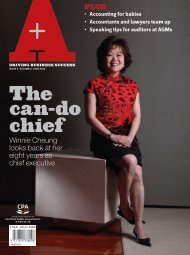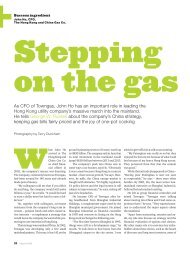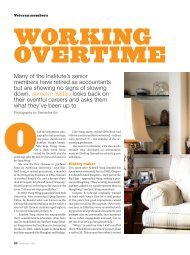Download - Hong Kong Institute of Certified Public Accountants
Download - Hong Kong Institute of Certified Public Accountants
Download - Hong Kong Institute of Certified Public Accountants
You also want an ePaper? Increase the reach of your titles
YUMPU automatically turns print PDFs into web optimized ePapers that Google loves.
SMPs and SMEs<br />
ost small-<br />
and medium-sized<br />
enterprises<br />
in <strong>Hong</strong><br />
<strong>Kong</strong> have a simple, if unchallenging, relationship<br />
with their accounting firm. Each<br />
year an accountant – usually a sole proprietor<br />
or a partner in a small firm – files the<br />
company’s audited financial statements and<br />
tax returns.<br />
Occasionally, a more ambitious company<br />
seeks a loan from a third party, which<br />
might involve the accountant presenting<br />
the company’s audited accounts to the prospective<br />
lender. Few SMEs demand much<br />
more from their accountant; few small accounting<br />
firms are able to provide much<br />
more, anyway.<br />
In most cases, it appears that small- and<br />
medium-sized practitioners have been content<br />
to continue with the business they have –<br />
afterall, all incorporated companies in <strong>Hong</strong><br />
<strong>Kong</strong> have to be audited regardless <strong>of</strong> size.<br />
“SMPs in <strong>Hong</strong> <strong>Kong</strong> continue to rely<br />
heavily on audit and tax services as their<br />
main engines <strong>of</strong> growth,” says Albert Au,<br />
chairman and chief executive <strong>of</strong>ficer <strong>of</strong> BDO<br />
<strong>Hong</strong> <strong>Kong</strong> and a past president <strong>of</strong> the <strong>Hong</strong><br />
<strong>Kong</strong> <strong>Institute</strong> <strong>of</strong> CPAs.<br />
However, SMPs are facing a changing<br />
world, especially since the global financial<br />
crisis unfolded. Accounting firms increasingly<br />
have to compete with cheaper alternative<br />
service providers that can undertake bookkeeping,<br />
tax and other non-audit functions<br />
not statutorily required to be performed by<br />
16 December 2012<br />
CPAs. Such companies can charge up to 30<br />
percent less than a CPA firm for a typical corporate<br />
tax filing, accountants estimate.<br />
Au, who is also a member <strong>of</strong> the <strong>Institute</strong>’s<br />
SMP leadership panel, says small firms<br />
will have to change their business model if<br />
they are to flourish. “SMPs need to adjust<br />
and find life after audit,” he urges.<br />
However, SMPs say diversification isn’t<br />
as simple as it sounds. “We all try to diversify<br />
into non-audit work,” says Erik Cheng,<br />
an <strong>Institute</strong> member who heads Erik Cheng<br />
& Company CPA, an SMP in Wanchai. “However,<br />
this is very difficult.”<br />
The <strong>Institute</strong>’s definition <strong>of</strong> an SMP covers<br />
a wide range <strong>of</strong> firms, from sole proprietorships<br />
to medium-sized firms. As <strong>of</strong> 31<br />
October, 1,054 firms (85.5 percent <strong>of</strong> the<br />
<strong>Institute</strong>’s 1,233 member firms) are sole proprietorships.<br />
A further 163 (13.2 percent)<br />
have four or fewer CPAs as partners.<br />
Size does matter, say CPAs, arguing that<br />
diversification means adding to a firm’s headcount.<br />
“We are not able to diversify into nonaudit<br />
assignments owing to the lack <strong>of</strong> a supporting<br />
workforce,” says <strong>Institute</strong> member<br />
David Ng <strong>of</strong> K. H. Ng & Co CPA in Mongkok.<br />
Business challenges<br />
SMPs rely on business from <strong>Hong</strong> <strong>Kong</strong>’s<br />
SMEs, a client base still feeling the effects <strong>of</strong><br />
the global economic downturn.<br />
“SMEs have had to brace themselves for<br />
a challenging 2012 in the wake <strong>of</strong> the euro<br />
crisis and the U.S. economic recession,” says<br />
Albert P. K. Lau, vice chairman <strong>of</strong> the <strong>Hong</strong><br />
<strong>Kong</strong> Small and Medium Enterprises Gen-<br />
eral Association, the city’s small business<br />
chamber <strong>of</strong> commerce.<br />
The <strong>Hong</strong> <strong>Kong</strong> government defines a<br />
SME as any manufacturing business employing<br />
fewer than 100 people in <strong>Hong</strong><br />
<strong>Kong</strong>, or any non-manufacturing business<br />
employing fewer than 50 people. That definition<br />
fits about 98 percent <strong>of</strong> all <strong>Hong</strong> <strong>Kong</strong><br />
businesses, which together account for the<br />
employment <strong>of</strong> 60 percent <strong>of</strong> the city’s workforce,<br />
the association says.<br />
While the 2012-13 government budget<br />
alleviated some financial burdens on SMEs<br />
through pr<strong>of</strong>its tax rebates and a waiver <strong>of</strong><br />
business registration fees, lobbyists, such as<br />
the association, argue that most small businesses<br />
in <strong>Hong</strong> <strong>Kong</strong> are under pressure.<br />
The cost <strong>of</strong> pr<strong>of</strong>essional services is a concern<br />
for SMEs, according to Cliff Chan, chief


